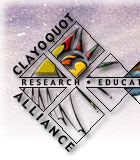 Research in the Clayoquot Alliance Research in the Clayoquot Alliance
Set within three spheres of theoretical and practical research
activity —the communities of the Clayoquot Sound region,
the academic community, and the institutional borderlands between
these— our goals are to engage in research activity that
illuminates the specific issues and needs that exist within and
between each sphere, and to create lasting bridges and links
between them.
What are borderlands?
Within communities of place like those in the Clayoquot Sound
region, the processes of economic structural adjustment, institutional
innovation and social transformation, and evolving understandings
of humanity’s relationships with uncertain and complex natural
systems, are all lived experience. Within academic communities,
they are topics for inquiry, motivated in many cases by a concern
for the contribution that research might make to greater resilience
and increased wellbeing in communities, but in all cases by a search
for knowledge and strong convictions about the importance of increased
understanding of these issues.
 The need to better understand the way in which research and knowledge
can support policy formation, decision-making and action —in
communities as well as in governments— has led to increasing
academic interest in such processes of boundary work, and in boundary
organizations serving as the structures within which those processes
are carried out. Two strikingly different fields of study address
the social borderlands that set the larger context. Within literary
theory there is work on cultural borderlands seen as places where
diverse cultures come together to trade, negotiate and attempt
to build shared understandings. Within administrative theory there
is a growing literature on organizational borderlands— cross-border
and cross-scale institutional settings that must bridge divergent
jurisdictional and cultural traditions. The need to better understand the way in which research and knowledge
can support policy formation, decision-making and action —in
communities as well as in governments— has led to increasing
academic interest in such processes of boundary work, and in boundary
organizations serving as the structures within which those processes
are carried out. Two strikingly different fields of study address
the social borderlands that set the larger context. Within literary
theory there is work on cultural borderlands seen as places where
diverse cultures come together to trade, negotiate and attempt
to build shared understandings. Within administrative theory there
is a growing literature on organizational borderlands— cross-border
and cross-scale institutional settings that must bridge divergent
jurisdictional and cultural traditions.
The
lived experience within Clayoquot Sound offers a record that can
be brought to bear in developing theory and testing the extent
to which that lived experience resists or appears to validate hypothetical
frames and conjectures. On the other hand, the needs of communities
within the Clayoquot Sound region challenge academic commentators
to demonstrate the relevance of their conceptual frameworks by
showing how they contribute to greater capacity within those communities
to participate effectively in governance and management pursued
in an array of new institutions from local to global scale. |


















